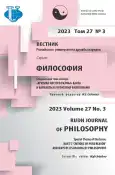В защиту стандартного подхода к логико-семантической экспликации неспецифического транспарентного прочтения сообщений о пропозициональных установках
- Авторы: Куслий П.С.1
-
Учреждения:
- МРОО «Русское общество истории и философии науки»
- Выпуск: Том 27, № 3 (2023): «КРИТИКА ЧИСТОГО РАЗУМА» КАНТА И ВАРИАНТЫ ЕЕ ПРОЧТЕНИЯ ФИЛОСОФАМИ
- Страницы: 677-697
- Раздел: ПРОБЛЕМЫ ЛОГИКИ
- URL: https://journal-vniispk.ru/2313-2302/article/view/325244
- DOI: https://doi.org/10.22363/2313-2302-2023-27-3-677-697
- EDN: https://elibrary.ru/EZPUAY
- ID: 325244
Цитировать
Полный текст
Аннотация
Исследуется феномен так называемого «третьего прочтения» сообщений о пропозициональных установках. Это прочтение, изначально исследовавшееся в диссертации Ж. Фодор (1973) и ставшее с тех пор одной из значимых проблем формальной семантики естественных языков, отличается от более известных de re и de dicto прочтений и тем, что является промежуточным случаем между ними. Если de re прочтение можно обозначить как транспарентное специфическое, а de dicto прочтение - как непрозрачное неспецифическое, то третье прочтение оказываются транспарентным неспецифическим. Стандартное решение, предложенное Фодор, вызывало бурное обсуждение в литературе и породило серию общепризнанных контрпримеров, которые, как считается, демонстрируют ограниченность решения Фодор. При этом альтернативные подходы к экспликации этих прочтений также страдали от формальных недостатков (например, не удовлетворяли требованию композициональности значения, которое является базовым требованием в формально-семантической литературе). Исследование выявило, что анализ всех сложных случаев третьего прочтения не учитывал в полной мере их синтаксическую структуру, которая оставалась незамеченной в силу присутствующего во многих из этих случаев эллипсиса. Показано, что восстановление этой синтаксической структуры позволяет проанализировать все сложные случае как простые с применением классического стандартного анализа, предложенного Фодор, дополненного базовыми принципами допустимости подстановки L-эквивалентных выражений в интенсиональных контекстах, восходящих к Г. Фреге и Р. Карнапу. В заключительной части демонстрируется то, как именно осуществляется экспликация основных сложных случаев «третьего прочтения» в терминах стандартного подхода.
Ключевые слова
Об авторах
Петр Сергеевич Куслий
МРОО «Русское общество истории и философии науки»
Автор, ответственный за переписку.
Email: kusliy@iph.ras.ru
ORCID iD: 0000-0003-0205-6414
кандидат философских наук, исследователь
Российская Федерация, Москва, 105062, Лялин пер., д. 1/36, стр. 2Список литературы
- Russell B. On Denoting. Mind. 1905;14:479-493.
- Fodor JD. The linguistic description of opaque contexts [dissertation]. London: Routledge; 1970. https://doi.org/10.4324/9781315880303
- Heim I, Kratzer A. Semantics in generative grammar. Oxford: Blackwell; 1998.
- Hintikka J. Semantics for propositional attitudes. In: Models for modalities. Dordrecht: Springer; 1969. P. 87-111.
- Keshet E. Good Intensions: Paving Two Roads to a Theory of the De re/De dicto Distinction [dissertation]. MIT; 2008.
- Keshet E. Split Intensionality: a new theory of scope of de re and de dicto. Linguistics and Philosophy. 2011;33(4):251-283. https://doi.org/10.1007/s10988-011-9081-x
- Percus O. Constraints on Some Other Variables in Syntax. Natural Language Semantics. 2000;8(3):173-229.
- Schwager M. Speaking of Qualities. In: Cormany E, Ito S, Lutz D, editors. Proceedings of semantics and linguistic theory (SALT) 19; 2011 Apr 15. P. 395-412.
- Bhatt R, Pancheva R. Late Merger of Degree Clauses. Linguistic Inquiry. 2004;35(1):1-45. https://doi.org/10.1162/002438904322793338
- Heim I. Degree Operators and Scope. In: Jackson B, Matthews T, editors. Proceedings of semantics and linguistic theory (SALT) 10; Cornell Linguistics Club, Ithaca NY; 2000. P. 40-64.
- Bresnan JW. Syntax of the comparative clause construction in English. Linguistic inquiry. 1973;4(3):275-343.
- Sudo Y. On De Re Predicates. In: Proceedings of WCCFL 31; 2014. P. 447-456.
- Quine WV. Quantifiers and Propositional Attitudes. The Journal of Philosophy. 1956;53(5):177-187. https://doi.org/10.2307/2022451
- Cresswell MJ, Stechow AV. “De Re” Belief Generalized. Linguistics and Philosophy. 1982;5(4):503-535.
- Baron C. Generalized Concept Generators. A unified account of de re, de dicto, and “third reading” attitude ascriptions. The Proceedings of NELS 46; 2015. P. 59-68.
- Percus O, Sauerland U. On the LFs of attitude reports. In: Proceedings of Sinn und Bedeutung 7; Konstanz: Universität Konstanz; 2003.
- Charlow S, Sharvit Y. Bound “de re” pronouns and the LFs of attitude reports. Semantics and Pragmatics. 2014;7(3):1-43. https://doi.org/10.3765/sp.7.3
Дополнительные файлы









